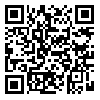

BibTeX | RIS | EndNote | Medlars | ProCite | Reference Manager | RefWorks
Send citation to:
URL: http://hcjournal.arums.ac.ir/article-1-96-en.html
Abstract
Background: Children with types I and II diabetes have
to follow a strict diet for an indefinite period of time. In addition, they are
also susceptible to stable cognitive impairments including decreased in
information processing speed due to the variations in blood sugar levels. The main propose of this study was to compare
children with types I and II diabetes in visual and auditory information processing
speed related to food stimulies.
Methods: Forty-three children with diabetes between
6 to 15 years of age admitted to the diabetes center of Firozghar Hospital
participated in this study. They were selected through available sampling. Visual and auditory stimuli were
presented for the assessment of information processing speed
related to food and neutral stimuli. SPSS v.14 was
applied to data analysis. ANOVA
was used for the comparison between the two groups.
Results: Findings showed that children with type I diabetes, in comparison to
type II diabetes experienced more damage in the speed of visual and auditory information processing.
Both
participants with diabetes type I and II processed images and sounds related to food
more quickly than
nonfood stimuli. Food processing speed increased in stimuli
related to food when children with type II diabetes experienced more perceived
stress.
Conclusions: Base on findings of this article using strategies
for self-regulation to avoid high-sugar foods have been very difficult because attention to food stimuli in children increases, self-regulation
programs are not easy to implement. Therefore, it is necessary to apply new behavioral therapy to
control diabetes in children.
Key words: Child,
Diabetes, Visual processing, audio processing, Food deprivation.
| Rights and permissions | |
 |
This work is licensed under a Creative Commons Attribution-NonCommercial 4.0 International License. |


